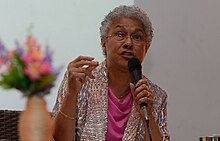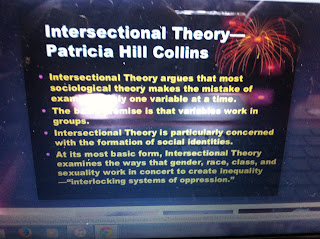BLACK SOCIAL HISTORY
Patricia Hill Collins
| BLACK SOCIAL HISTORY |
| Patricia Hill Collins | |
|---|---|
 | |
| Born | May 1, 1948 Philadelphia |
| Residence | College Park, Maryland |
| Era | Contemporary philosophy |
| Region | Western Philosophy |
| School | Black feminism, American pragmatism |
| Institutions | Brandeis University, Harvard University |
Main interests
| Sociology of knowledge |
Patricia Hill Collins (born May 1, 1948) is currently a Distinguished University Professor of Sociology at the University of Maryland, College Park.[1] She is also the former head of the Department of African American Studies at the University of Cincinnati, and the past President of the American Sociological Association Council. Collins was the 100th president of the ASA and the first African American woman to hold this position.[2]
Collins' work primarily concerns issues involving feminism and gender within the African-American community. She first came to national attention for her book Black Feminist Thought: Knowledge, Consciousness and the Politics of Empowerment, originally published in 1990.[3]
Early life and career
Collins was born in Philadelphia, Pennsylvania in 1948. The only daughter of Albert Hill, factory worker and Eunice Randolph Hill, a secretary. Collins attended the Philadelphia public schools.[4]
After obtaining her bachelor's degree from Brandeis University in 1969 as a Sociology major, she continued to earn a Master of Arts Degree in Teaching in Social Science Education from Harvard University in 1970.[5] From 1970 to 1976, she was a teacher and curriculum specialist at St. Joseph Community School, among two others, in Roxbury, Boston.[6] She continued to become the Director of the Africana Center at Tufts University from 1976 to 1980. At Tufts she met and married Roger L. Collins, a professor of education at the University of Cincinnati, with whom she has one daughter, Valerie L. Collins.[7]
She then completed her doctorate in sociology back at Brandeis in 1984. While earning her PhD, Collins worked as an assistant professor at the University of Cincinnati beginning in 1982. In 1990, Collins published her first book, "Black Feminist Thought: Knowledge, Consciousness and the Politics of Empowerment". A revised tenth anniversary edition of the book was published in 2000, and subsequently translated into Korean in 2009.
Published Work
Books
In 1990, Collins published Black Feminist Thought: Knowledge, Consciousness and the Politics of Empowerment, which looked at the title topic through such figures as Angela Davis, Alice Walker and Audre Lorde. The analysis incorporated a wide range of sources, including fiction, poetry, music and oral history. This book is the first book to incorporate the literature of and by African-American women. Collin's work concluded with three central claims:
- Oppressions of race, class, gender, sexuality and nation are intersecting, mutually constructing systems of power. Collins utilizes the term "Intersectionality," originally coined by Kimberlé Crenshaw, to refer to this simultaneous overlapping of multiple forms of oppression.
- Because Black women have unique histories at the intersections of systems of power, they have created world views out of a need for self-definition and to work on behalf of social justice.
- Black women's specific experiences with intersecting systems of oppression provide a window into these same processes for other individuals and social groups.
In her book, Black Feminist Thought, Collins posits how Black feminist studies made of Black women's works highlight two very important themes. One being "how Black women's paid work is organized within intersecting oppressions of race, class, and gender."[8] Although these women have fled from domestic work in private homes, they continue to work at low-paying jobs. Moreover, she continues, the theme that "concerns how Black women's unpaid family labor is simultaneously confining and empowering" for them is also extremely important.[9] Collins emphasizes this point because she points out that Black women see the unpaid work of their household as a method of resistance to oppression rather than a method of manipulation by men.[10] Her first book, Black Feminist Thought: Knowledge, Consciousness and the Politics of Empowerment, was published in 1990.[11]
Published in 1992, Race, Class and Gender: An Anthology was a collaboration with Margaret Andersen, in which Collins helped edit a compilation of essays on the issues of race, class and gender. The book is widely recognized for shaping the field of race, class and gender studies as well as its related concept of intersectionality. The included essays cover a variety of topics, from historical trends and their lasting effects today, to the current media portrayal of minority groups. The sixth edition was published in 2007.[12]
Collins published a third book Fighting Words: Black Women and the Search for Justice in 1998. Fighting Words focused on how black women have confronted the injustices against them within black communities, expanding on the idea of "outsiders within" from her previous book. She examines how outsiders resist the majority’s perspective, while simultaneously pushing for and creating new insight on the social injustices that exist. Collins also notes how acknowledging the social theories of oppressed groups are important because their different experiences have created new angles of looking at human rights and injustice. This has not always been the case because, as she points out, the “elites possess the power to legitimate the knowledge that they define as theory as being universal, normative, and ideal".[13] “Fighting Words” seeks to explore how black women can change from simply having “thoughts” to rather being considered as having “theories”.
Another book by Collins is Black Sexual Politics: African Americans, Gender, and the New Racism, published in 2004. The work argued that racism and heterosexism were intertwined, and that ideals of beauty work to oppress African-Americans males and females, both homo- and heterosexual. Collins believes that people must examine the intersection of race, class, and gender, and that looking at each issue separately leads to missing a large part of the problem. Her argument for resisting the creation of such narrow gender roles requires action on individual and community levels, and recognizing success in areas other than those typically respected by Americans, such as money or beauty. Collins also makes the important observation that the oppression of African-Americans cannot be successfully resisted until oppression within their own group, such as towards women or LGBT, are stopped. Black Sexual Politics won the Distinguished Publication Award from the American Sociological Association.[14]
In 2006 she published From Black Power to Hip Hop: Racism, Nationalism, and Feminism, which examines the relationship between black nationalism, feminism and women in the hip-hop generation. The book is a compilation of multiple essays of hers, written over multiple years, compiled into one cohesive examination of the current situation of African-Americans. Collins examines the prejudice existing today, which she calls "new racism," and explores how old ideas about what racism is prevents society from recognizing and fixing the wrongdoings that still greatly exist today. The author explores a range of examples, from American identity, to motherhood, to feminine portrayal in hip-hop. Following the Civil Rights Movement, Collins argues, there was a "shift from color-blind racism that relied on strict racial segregation to a seemingly colorblind racism that promised equal opportunities yet provided no lasting avenues for African American advancement".[15]
In 2009, she published Another Kind of Public Education: Race, Schools, the Media and Democratic Possibilities, in which Collins encourages the public to be more aware of and prevent the institutional discrimination young African American kids are suffering from today in the public education system. Claiming that the education system is greatly influenced by the media, Collins examines racism as a system of power preventing education and democracy to reach its full potential.[16]
In 2010, Collins published The Handbook of Race and Ethnic Studies.[17]
In 2012, Collins published On Intellectual Activism[18]
Career honors
Collins is recognized as a social theorist, drawing from many intellectual traditions. Her more than 40 articles and essays have been published in a wide range of fields, including philosophy, history, psychology, and most notably sociology.
- Faculty of the Year Award at the University of Cincinnati (1991)[19]
- C. Wright Mills Award for the first edition of Black Feminist Thought (1991) [20]
- Distinguished Publication Award by the Association for the Women in Psychology for Black Feminist Thought (1991)[21]
- Letitia Woods Brown Memorial Book Prize by the Association of Black Women Historians for Black Feminist Thought (1991)[22]
- Award for Outstanding Service to African American Students at the University of Cincinnati (1993)[23]
- Jessie Bernard Award by the American Sociological Association for significant scholarship in the area of Gender (1993)[24]
- Named The Charles Phelps Taft Professor of Sociology by the University of Cincinnati, making her the first ever African American, and only the second woman, to hold this position (1996).[25]
- Emeritus Status from University of Maryland, College Park (2005)[26]
- Distinguished University Professor from University of Maryland (2006)[27]
- American Sociological Association Distinguished Scholarly Book Award for her book Black Sexual Politics[28] (2007)[29]
- Morris Rosenberg Award for Student Mentorship from the University of Maryland (2009)[30]
- Alumni Achievement Award from the Harvard Graduate School of Education (2011)[31]
- Joseph B. and Toby Gittler Prize her contributions to racial and ethnic relations from Brandeis University (2012)[32]
Selected bibliography[edit]
- Another Kind of Public Education: Race, the Media, Schools, and Democratic Possibilities, ISBN 0-8070-0018-3, 2009
- From Black Power to Hip Hop: Racism, Nationalism, and Feminism, ISBN 1-59213-092-5, 2006
- Black Sexual Politics: African Americans, Gender, and the New Racism, ISBN 0-415-93099-5, 2005
- Fighting Words: Black Women and the Search for Justice, ISBN 0-8166-2377-5, 1998
- Race, Class and Gender: An Anthology, ISBN 0-534-52879-1, co-edited w/ Margaret Andersen, 1992, 1995, 1998, 2001, 2004, 2007, 2010
- Black Feminist Thought: Knowledge, Consciousness and the Politics of Empowerment, ISBN 0-415-92484-7, 1990, 2000
Selected journal articles
- "Like One of the Family: Race, Ethnicity, and the Paradox of the US National Identity." in Ethnic and Racial Studies[33]
- Collins, Patricia Hill. 2012. "Just Another American Story? The First Black First Family." in Qualitative Sociology[34]
- Collins, Patricia Hill. 2006. "New Commodities, New Consumers: Selling Blackness in the Global Marketplace," in Ethnicities[35]
- Collins, Patricia HIll. 1998. "The Tie that Binds: Race, Gender, and U.S. Violence." in Ethnic and Racial Studies[36]
- Collins, Patricia Hill. 1996. "What's In a Name: Womanism, Black Feminism and Beyond" in Black Scholar[37]
- Collins, Patricia Hill. 1987. "The Meaning of Motherhood in Black Culture and Black Mother/Daughter Relationships" in Sage: A Scholarly Journal on Black Woman[38]






















































































No comments:
Post a Comment